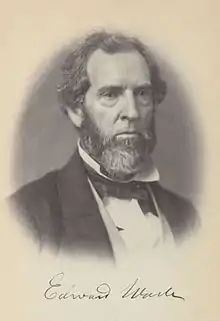Edward Wade
Edward Wade (November 22, 1802 – August 13, 1866) was a U.S. Representative from Ohio, brother of Benjamin Franklin Wade.
Edward Wade | |
|---|---|
 | |
| Member of the U.S. House of Representatives from Ohio's 19th district | |
| In office March 4, 1853 – March 3, 1861 | |
| Preceded by | Eben Newton |
| Succeeded by | Albert G. Riddle |
| Personal details | |
| Born | November 22, 1802 West Springfield, Massachusetts |
| Died | August 13, 1866 (aged 63) East Cleveland, Ohio |
| Political party | Republican |
Born in West Springfield, Massachusetts, Wade received a limited schooling. He moved to Andover, Ohio, in 1821, where he studied law. He was admitted to the bar in 1827 and commenced practice in Jefferson, Ohio. He was served as Justice of the Peace of Ashtabula County in 1831. He moved to Unionville in 1832. He served as prosecuting attorney of Ashtabula County 1833. He moved to Cleveland in 1837.
Wade was elected as a Free-Soil candidate to the Thirty-third Congress and reelected as a Republican to the Thirty-fourth, Thirty-fifth, and Thirty-sixth Congresses (March 4, 1853 – March 3, 1861). In January 1854, he was one of six signatories of the "Appeal of the Independent Democrats", drafted to oppose the Kansas-Nebraska Act. He was not a candidate for renomination in 1860.
He died in East Cleveland, Ohio, August 13, 1866, and was interred in Woodland Cemetery in Cleveland, Ohio.[1]
References
- Perkins, Olivera (December 4, 2016). "Marketing Cleveland". The Plain Dealer. p. F1.
Bibliography
- United States Congress. "Edward Wade (id: W000006)". Biographical Directory of the United States Congress.
![]() This article incorporates public domain material from the Biographical Directory of the United States Congress website http://bioguide.congress.gov.
This article incorporates public domain material from the Biographical Directory of the United States Congress website http://bioguide.congress.gov.
| U.S. House of Representatives | ||
|---|---|---|
| Preceded by Eben Newton |
Member of the U.S. House of Representatives from Ohio's 19th congressional district 1853–1861 |
Succeeded by Albert G. Riddle |
